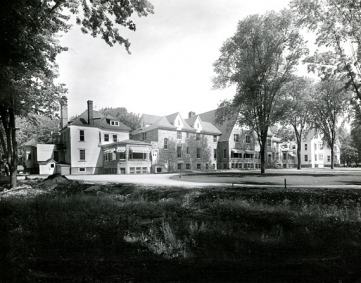We invite you to read this enlightening article co-authored by three members of the team at the Albert-Prévost Mental Health Centre. Thanks to the authors for this glimpse into history.
After returning from Paris where he had completed his post-doctoral studies in neurology, Dr Albert Prévost founded the Albert-Prévost Sanitarium in Cartierville in 1919. Adopting a highly innovative approach at a time when the mentally ill were generally confined to asylums, he received people suffering from neuroses, mild psychoses, addictions and neurasthenia, collectively referred to as nervous disorders. With the indispensable help of Dr Edgar Langlois and Nurse Charlotte Tassé, medical treatments were given using an approach that combined psychotherapy and community therapy. After Dr. Albert-Prévost died in a car accident in 1926, nurses Tassé and Lépine continued to run the establishment, ensuring its survival and maintaining a high standard of care.
Having been renamed the Albert-Prévost Institute in 1955, the mental health centre played a pioneering role the development of psychiatry in Quebec by adopting therapeutic approaches that had gained favour in the United States and Europe, and by focusing on patient-centred treatment as opposed to therapies aimed solely at treating the illness. Dr Camille Laurin played a pivotal role at this time by ensuring a transition from compassionate treatment to therapy based on specific psychiatric issues, using approaches that were evolving rapidly in this era.
In the sixties, the community-based approach to psychiatry, based on a network of neighbourhood clinics, improved access to local mental health resources and treatment teams by bringing them closer to the populations they served; prevention became an important focus for these teams.
In 1972, the Institute became the Albert-Prévost Pavilion at Montreal’s Sacré-Coeur Hospital.
Another major development came in the 1990s, when the entire staff was reorganized into program-oriented clinics, with the intention of offering a range of therapies considered appropriate for each specific condition.
The overall effect of this initiative–tailoring care to patients by taking into consideration their personal and social situation—has made the Albert-Prévost Pavilion an outstanding teaching environment in psychiatry that receives up to half of the psychiatry residents studying at the University of Montreal, as well as nurses, psychologists and physiotherapists doing stages.
Jean Leblanc
Christiane Bertelli
Thanh-Lan Ngô

